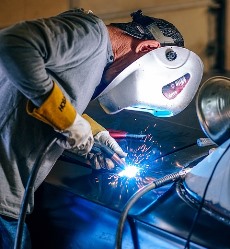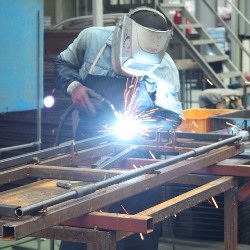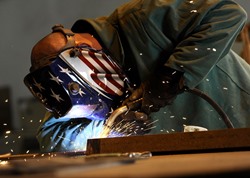How to Select the Right Welding Training Program near Westport Massachusetts
 Locating the right welder trade school near Westport MA is an important first step to launching your new occupation as a professional welder. But since there are numerous schools to choose from, how do you determine which ones to consider? And more importantly, once you have narrowed down your options, how do you pick the best one? A number of prospective students begin by looking at the schools that are nearest to their homes. When they have located those that are within driving distance, they are drawn toward the least expensive one. Yes, location and the cost of tuition are important considerations when examining welder trade schools, but they are not the only ones. Other considerations include such things as reputation, accreditation and job placement rates. So before initiating your search for a vocational school to become a welder, it’s sensible to create a list of qualifications that your selected school must have. But before we delve into our due diligence checklist, let’s cover a little bit about how to become a welder.
Locating the right welder trade school near Westport MA is an important first step to launching your new occupation as a professional welder. But since there are numerous schools to choose from, how do you determine which ones to consider? And more importantly, once you have narrowed down your options, how do you pick the best one? A number of prospective students begin by looking at the schools that are nearest to their homes. When they have located those that are within driving distance, they are drawn toward the least expensive one. Yes, location and the cost of tuition are important considerations when examining welder trade schools, but they are not the only ones. Other considerations include such things as reputation, accreditation and job placement rates. So before initiating your search for a vocational school to become a welder, it’s sensible to create a list of qualifications that your selected school must have. But before we delve into our due diligence checklist, let’s cover a little bit about how to become a welder.
Welding Degree and Certificate Training Programs
 There are multiple options available to obtain training as a welder in a trade or technical school. You can earn a diploma, a certificate or an Associate Degree. Bachelor Degrees are offered in Welding Engineering or Welding Technology, but are more advanced courses than most journeyman welders will need. Some programs are also made available in conjunction with an apprenticeship program. Following are short summaries of the most typical welding programs offered in the Westport MA.
There are multiple options available to obtain training as a welder in a trade or technical school. You can earn a diploma, a certificate or an Associate Degree. Bachelor Degrees are offered in Welding Engineering or Welding Technology, but are more advanced courses than most journeyman welders will need. Some programs are also made available in conjunction with an apprenticeship program. Following are short summaries of the most typical welding programs offered in the Westport MA.
- Diploma and Certificate Programs are normally made available by trade and technical schools and take about 1 year to finish. They are more hands-on training in nature, designed largely to teach welding skills. They can provide a good foundation for a new journeyman or apprentice welder, or specialized skills for working welders.
- Associate Degree Programs will take 2 years to finish and are usually offered by community colleges. An Associate Degree in Welding Technology offers a more extensive education than the diploma or certificate while still supplying the foundation that readies students to enter the workforce.
A number of states and municipalities do have licensing requirements for welders, so don’t forget to check for your location of future employment. As required, the welding school you choose should ready you for any licensing exams that you will have to pass in addition to providing the proper training to become a qualified welder.
Welding Certification Alternatives
 There are a number of institutions that provide welder certifications, which test the knowledge and skill level of those applying. A large number of Westport MA employers not only demand a degree or certificate from an accredited welding program, but also certification from a renowned agency such as the American Welding Society (AWS). Different certifications are offered based on the type of work that the welder performs. Some of the skills that certification can acknowledge are the welder’s ability to
There are a number of institutions that provide welder certifications, which test the knowledge and skill level of those applying. A large number of Westport MA employers not only demand a degree or certificate from an accredited welding program, but also certification from a renowned agency such as the American Welding Society (AWS). Different certifications are offered based on the type of work that the welder performs. Some of the skills that certification can acknowledge are the welder’s ability to
- Operate in compliance with specific codes
- Work with specified metal thicknesses
- Work with various types of welds
- Work based on contract specifications
As previously stated, various cities, states or local municipalities have licensing requirements for welders. Of those calling for licensing, many also require certification for various types of work. Certification is also a way to prove to employers that you are an extremely skilled and experienced welder. So just as with licensing, look into the requirements for your local area and make certain that the welding trade school you choose readies you for certification as needed.
Questions to Ask Welding Tech Programs
 After you have chosen the credential you would like to attain, a diploma, certificate or degree, you can start to evaluate schools. As you are no doubt aware, there are many welding trade and vocational schools in the Westport MA area. That’s why it’s necessary to decide in advance what qualifications your selected school must have. We have previously covered two significant ones that most people consider first, which are location and the cost of tuition. As stated, although they are very important qualifiers, they are not the only ones that must be looked at. After all, the program you pick is going to furnish the training that will be the foundation of your new vocation as a welder. So following are some additional factors you might want to consider before picking a welding vocational school.
After you have chosen the credential you would like to attain, a diploma, certificate or degree, you can start to evaluate schools. As you are no doubt aware, there are many welding trade and vocational schools in the Westport MA area. That’s why it’s necessary to decide in advance what qualifications your selected school must have. We have previously covered two significant ones that most people consider first, which are location and the cost of tuition. As stated, although they are very important qualifiers, they are not the only ones that must be looked at. After all, the program you pick is going to furnish the training that will be the foundation of your new vocation as a welder. So following are some additional factors you might want to consider before picking a welding vocational school.
Accreditation. It’s extremely important that the welding tech school you choose is accredited by either a national or a regional agency. There are two standard kinds of accreditation. The school may earn Institutional Accreditation based on all of their programs. Programmatic Accreditation is based on a single program the school offers, for instance Welding Technology. So make sure that the program you pick is accredited, not just the school itself. Also, the accreditation should be by a U.S. Department of Education recognized accrediting agency, like the Accrediting Commission of Career Schools and Colleges of Technology (ACCSCT). In addition to helping ensure that you receive an excellent education, the accreditation may also help in acquiring financial aid or student loans, which are frequently unavailable in Westport MA for schools that are not accredited. Also, for those states or local governments that mandate licensing, they may require that the welding training program be accredited as well.
Apprenticeship and Job Assistance Programs. Many welding degree or certificate programs are provided combined with an apprenticeship program. Other schools will help place you in an apprenticeship or a job upon graduation. Find out if the schools you are looking at help in placing students in apprenticeships or have a job placement program. The schools should have relationships with local unions and various metal working businesses to which they can refer their students. Older schools may have a larger network of graduates that they can rely upon for placements. These programs can help students find employment and establish associations within the Westport MA welding community.
Job Placement and Completion Rates. The completion rate is the portion or percentage of students that enroll in an educational program and finish it. It’s crucial that the welding program you choose has a high completion rate. A lower rate could signify that the students who joined the program were unhappy with the training, the teachers, or the facilities, and quit. The job placement rate is also a good indicator of the caliber of training. A higher job placement rate will not only confirm that the program has an excellent reputation within the trade, but also that it has the network of Westport MA employer relationships to assist students secure apprenticeships or employment upon graduation.
Modern Equipment and Facilities. Once you have decreased your choice of welding programs to two or three possibilities, you should consider visiting the campuses to look over their facilities. Verify that both the facilities and the equipment that you will be instructed on are modern. Specifically, the training equipment should be comparable to what you will be using on the job. If you are uncertain what to look for, and are already in an apprenticeship program, consult with the master welder you are working under for guidance. If not, ask a local Westport MA welding contractor if they can give you a few suggestions.
School Location. Even though we already briefly discussed the relevance of location, there are a few additional points that we need to address. You should keep in mind that unless you have the ability to move, the welding school you pick needs to be within driving distance of your Westport MA home. If you do opt to enroll in an out-of-state school, besides relocation expenses there may be higher tuition fees for out-of-state residents. This is especially the case for welder degree programs offered by community colleges. Additionally, if the school provides a job placement or apprenticeship program, often their placements are within the school’s regional community. So the location of the school needs to be in an area or state where you subsequently will want to work.
Smaller Classes. One-on-one training is essential for a hands-on trade such as welding. It’s possible to be overlooked in larger classes and not get much individualized training. Find out what the usual class size is for the welding schools you are reviewing. Ask if you can attend a couple of classes so that you can experience just how much personal attention the students are getting. While there, talk with several of the students and get their opinions. Similarly, talk with some of the instructors and ask what their welding experience has been and what certifications and credentials they hold.
Convenient Class Scheduling. Many people learn a new trade while still working at their present job. Confirm that the class schedules for the schools you are looking at are convenient enough to satisfy your needs. If you can only attend classes at night or on weekends near Westport MA, make sure that the schools you are assessing provide those alternatives. If you can only enroll on a part-time basis, make sure that the school you pick offers part-time enrollment. Also, check to see what the protocol is to make up classes should you miss any due to illness, work or family circumstances.
Online Welder Degree and Certificate Programs
 Welding is very much a manual kind of profession, and for that reason not very compatible with online training. Even so, there are a few online welding classes offered by specific community colleges and trade schools in the greater Westport MA area that may count toward a degree or certificate program. These classes primarily cover such topics as safety, reading blueprints, and metallurgy. They can help give a novice a foundation to begin their training and education. Nevertheless, the most important point is that you can’t learn how to weld or use welding materials until you actually do it. Naturally that can’t be performed online. These skills have to be learned in an on-campus setting or in an apprenticeship. Online or distance learning is better suited for experienced welders that want to advance their knowledge or possibly attain a more advanced degree. So if you should come across an online welding degree or certificate program, be very careful and confirm that the bulk of the training is done on campus or in a workshop type of environment.
Welding is very much a manual kind of profession, and for that reason not very compatible with online training. Even so, there are a few online welding classes offered by specific community colleges and trade schools in the greater Westport MA area that may count toward a degree or certificate program. These classes primarily cover such topics as safety, reading blueprints, and metallurgy. They can help give a novice a foundation to begin their training and education. Nevertheless, the most important point is that you can’t learn how to weld or use welding materials until you actually do it. Naturally that can’t be performed online. These skills have to be learned in an on-campus setting or in an apprenticeship. Online or distance learning is better suited for experienced welders that want to advance their knowledge or possibly attain a more advanced degree. So if you should come across an online welding degree or certificate program, be very careful and confirm that the bulk of the training is done on campus or in a workshop type of environment.
Attending a Welding School in Westport MA?
If you have decided to enroll in a welder training program in the Westport Massachusetts area, you may find the following information both informative and helpful about the location of your new school campus.
Westport, Massachusetts
The village of North Westport lies in the town. Other named areas of the town are "Westport Point" with the dock on the Westport River where Main Road meets the river, "Central Village" with town offices, retail stores and businesses, "Head of Westport" at the head of the east branch of the river and the area referred to either as "Acoaxet" or "Westport Harbor," which is between the west branch of the river and Rhode Island. This area is actually cut off from the rest of Massachusetts by water and Rhode Island.
Westport, so named because it was the westernmost port in the Massachusetts Bay Colony, was first settled in 1670 as a part of the town of Dartmouth by members of the Sisson family. The river, and the land around it, was called "Coaksett" in the original deed; the name, now spelled "Acoaxet," lives on in the southwestern community along the western branch of the Westport River. Like many areas in the region, Westport was affected by King Philip's War, when the native Wampanoag population rebelled against the oppression of the English settlers. Several small mills were built along the Westport River, and in 1787, the town, along with the town of New Bedford, seceded from Dartmouth.
During the late 18th century, into the early 19th century, a Quaker businessman, sea captain, patriot, and abolitionist named Paul Cuffee and his wife settled in the town, on the banks of the Westport River where he launched a shipyard. Cuffee became one of the richest free blacks in the United States at the time, and helped the effort to try to emigrate black slaves to Sierra Leone in Africa.
Select the Right Welding Technical School Westport MA
Choosing the right welding school will undoubtedly be the most important decision you will make to start your new trade. You originally stopped by our website because you had an interest in Going To School For Welding. However, as we have covered in this article, there are a number of things that you will need to evaluate and compare among the programs you are considering. It’s a necessity that any welder training that you are assessing includes a considerable amount of hands-on training. Classes need to be smaller in size and each student must have their personal welding machine to train on. Classroom teaching should offer a real-world frame of reference, and the training program should be current and in-line with industry standards. Training programs vary in duration and the type of credential provided, so you will have to determine what length of program and certificate or degree will best satisfy your needs. Each program offers unique possibilities for certification also. Perhaps the best approach to research your final list of schools is to go to each campus and talk with the teachers and students. Invest some time to sit in on some classes. Tour the campus and facilities. Make certain that you are confident that the school you decide on is the right one for you. With the proper training, effort and commitment, the final result will be a new occupation as a professional welder in Westport MA.
Business Results 1 - 10 of 3





